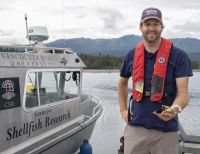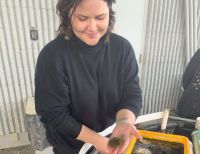Three VIU Department of Fisheries and Aquaculture researchers are leading an investigation on the effects of heat waves, due to climate change, on marine animals.
Climate change is causing more extreme temperature events, such as heat waves, in marine environments. Researchers at Vancouver Island University (VIU) are studying how these changes are affecting the health of fish and shellfish thanks to support from the Canada Foundation for Innovation and BC Knowledge Development Fund.
Drs. Spencer Russell, Timothy Green and Dan Baker, VIU Fisheries and Aquaculture Professors, received $548,973 to design research projects that aim to understand how extreme temperature fluctuations impact farmed finfish and shellfish.
The three lead researchers say that many studies have focused on higher average seawater temperatures due to climate change, but that approach may limit our understanding of how climate variation can impact seafood security, both now and in the future. The VIU projects will look at how marine heat waves, which are periods of abnormally warm seawater events that can last for a few days to months, impact the health of farmed finfish and shellfish. These events are expected to increase in frequency in the future because of the effects of climate change. While the research focuses on aquaculture environments, it will also provide information on how different species could adapt to climate change.
“By identifying how marine heatwaves alter finfish and shellfish behaviour, physiology and immune responses, we will improve our knowledge on how these warm water events increase the susceptibility of aquatic animals to disease and make significant advances in the management of finfish and shellfish health and welfare,” says Russell.
Green is investigating how marine heat waves can cause death in farmed oysters. Baker will examine how heat waves may alter how wild and farmed salmon and sturgeon respond and adapt to higher summer temperatures. Russell is investigating the impact on gill health of farmed salmonids. Their research will take place at three VIU facilities: the Centre for Shellfish Research, the International Centre for Sturgeon Studies and the Centre for Innovation in Fish Health.
“The world is changing, and we must make informed decisions to change with it successfully,” says Baker. “British Columbia has a crucial part to play in providing food to Canada and the rest of the world in this future, and we believe we can help by addressing challenges in aquaculture industries hit hard by problems created by climate change and other anthropogenic activities.”
Minimizing disease in aquaculture will allow the Canadian aquaculture industry to flourish and expand, creating meaningful jobs for First Nations and people in isolated coastal communities
-30-
MEDIA CONTACT:
Rachel Stern, Communications Officer, Vancouver Island University
C: 250.618.0373 l E: [email protected] | T: @VIUNews
















